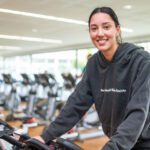From the very beginning of her undergraduate studies, Yamini knew she wanted to be in research. She’s now living out her goals and is two and a half years into a PhD on extracting Rare Earth Elements (REEs) alongside her supervisor, Laurence.
Yamini Kannappan is completing a PhD in mining and metallurgical engineering at the WA School of Mines (Curtin Kalgoorlie), co-supervised by Curtin’s Associate Professor Laurence Dyer, Associate Professor Richard Alorro and Associate Professor Bogale Tadesse. Yamini and Laurence reflect on extracting Rare Earth Elements (REEs), transitioning from a Master student to PhD and the significant role of a PhD supervisor.
Yamini:
I started off with my undergraduate degree back home in India, which was balanced between material science and metallurgy. I knew when I started that I was going to do research, but I didn’t know what I wanted to specialise in. I started researching and discovered that extractive metallurgy had several unsolved challenges, so I applied for my Master at Curtin.
I met Laurence while I was doing my Masters – he was like a mentor. If I had a problem, I could go and ask him. When I finished my Masters and was considering whether to work in the industry or pursue a research pathway, I was lucky in that he came to me with a project.
My PhD project is on extracting Rare Earth Elements (REEs). REEs are key ingredients for making magnets, batteries and other pieces of technology, and are used in everything from mobile phones to cars. Due to increasing global demand and the importance of these elements in the production of modern technology, there is a need to re-evaluate traditional processes for extracting REEs.
This project aims to develop an alternative technology to processes currently used in the industry. It has since split into three sections, and I’m now focused on adapting technology for low-grade ores and mine wastes.
The biggest challenge for me in doing this PhD was transitioning from being a Masters student to a PhD student.
As a Master student, you have set out deadlines for assignments and everything. With a PhD, you must create your own deadlines, work in your own space, and make time for it. It was quite an adaptation.
But there have been lots of small wins throughout the last two and a half years. I did a presentation at a conference in Hyderabad, India, where I was awarded a prize in oral presentation, and this year, I applied for, and was awarded, the MRIWA PhD Scholarship for Women.
I’ve also had the opportunity to work for Lynas Rare Earth, an ethical and environmentally responsible producer of Rare Earth Materials in Kalgoorlie. I did an industry placement with the company during their commissioning phase, which was an exciting experience where I learned so much.
In terms of building a strong student/supervisor relationship, empathy is a big one for me. If you can’t see the situation from the other person’s perspective, then it’s almost lost already. Open communication is probably the other one. Getting to know each other – not just from a professional perspective – but getting to know what make the other person tick can help you share the passion in the project.
Laurence:
From a very functional perspective, we had a project that we needed people to work on. But the reason why we specifically nudged Yamini in the PhD direction was the combination of her attitude and aptitude. Her thirst for knowledge and uncertainty of whether she wanted to be in a research or industry perspective – neither entirely academic nor super-industry focussed – was a good balance. This mix of both worlds tends to give useful industrial applications out of applied research.
I remember back to the roles of my supervisors and mentors in my journey as a PhD student and early career researcher. They were incredibly significant in my development, and I don’t think my career path would have been the same without them. I’m trying to take all the best things about those experiences and provide that to the students I supervise.
The point of a PhD is to train somebody on how to be a researcher – you have to treat them as both a colleague and a student.
Your expectations can’t be too high, and you need to be supportive, help develop them as a researcher and provide the opportunity for them to grow into the professionals they want to be.
From my perspective, particularly in Yamini’s journey, the highlight has been seeing the leaps and bounds in confidence as she’s grown through the project. She was initially very uncertain, but then as she’s done more presentations and grown into the work, you can see it in the way that she handles herself. She’s much more confident and comfortable in professional settings. It’s just fantastic to see her development.
It was helpful that we got to know each other a bit more over the coursework Master before Yamini started her PhD. There was already a pretty strong teacher-student relationship, which has now morphed into a colleague relationship as she’s become more of an autonomous researcher.

Yamini Kannappan
Yamini is a PhD candidate at the WA School of Mines, Curtin University. With a foundation in Metallurgical Engineering, her journey from undergrad to master’s and doctoral researcher has been fuelled by a commitment to sustainable practices. Her PhD project aims to extract Rare Earth Elements from sub-economic ores and process tailings using green solvents. Yamini is a recipient of the MRIWA PhD Scholarship for Women, the Destination Australia Scholarship, and the CIPRS scholarship.

Associate Professor Laurence Dyer
Laurence leads the Metallurgical Engineering program from Curtin University’s historic Kalgoorlie campus in the heart of Western Australia’s Goldfields. Originally trained in chemistry and physics, he has spent more than 15 years in education and industry-based research in extractive metallurgy and has a passion for developing solutions that both improve business and sustainability outcomes.



